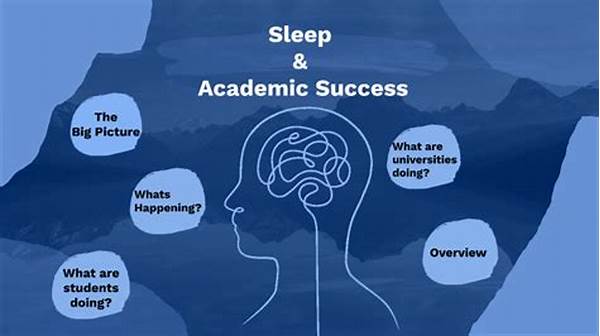- The Science of Sleep and Learning
- Creating Winning Sleep Habits
- Establishing the Connection Between Sleep and Success
- Creating Awareness and Adoption of Healthy Sleep Habits
- Monitoring and Evaluating Progress
- Sleep and Emotional Well-being
- Implementing a Sleep-Focused Curriculum
- Cognitive Enhancement Through Sleep
Ah, sleep—a seemingly elusive commodity in the lives of many students. Yet, it serves as one of the most effective tools for enhancing academic performance. Have you ever found yourself cramming for an exam night after night, only to realize that your memory is as hazy as the fog outside your window? If you nodded along, you’re certainly not alone. According to recent studies, quality sleep is pivotal for optimum cognitive function, emotional stability, and overall academic success. Interested in finding the secret sauce for academic brilliance? Well, sleep might just be that magic ingredient.
Read More : Top 10 Study Hacks That Work For Students In 2025
In an era marked by digital distractions and round-the-clock connectivity, securing adequate sleep can resemble scaling a mountain. However, the benefits it offers are unparalleled. Imagine waking up refreshed, able to absorb new information as easily as a sponge soaking up water. Academic life offers numerous challenges. Beyond textbooks and assignments, stress and mental fatigue also confront students. Yet, with sufficient sleep, these hurdles become mere stepping stones. The role of sleep in academic performance is as foundational as mastering a subject. Without it, achieving your full learning potential can be like trying to solve a complex equation missing several variables.
The Science of Sleep and Learning
Behind the scenes, while students might be dreaming of passing their exams, their brains work diligently to consolidate learning. Studies indicate that different stages of sleep contribute variously to memory consolidation, critical for transferring short-term knowledge to long-term comprehension. For instance, REM sleep aids in forming procedural memory—crucial for activities like learning to play an instrument or solving math problems. Non-REM sleep, on the other hand, assists with declarative memory—vital for understanding theories and concepts.
However, maintaining a sleep schedule that facilitates these processes requires diligence and sometimes a reshuffle of priorities. Sacrificing sleep for late-night study sessions might seem efficient, yet it usually leads to a mental block the following day. The evidence is compelling, many students experience what can be termed ‘brain fog’, exhibiting poor concentration and diminished creativity due to erratic sleep patterns. Aren’t you convinced yet? You might be tempted to dismiss sleep as nothing more than a leisurely activity. Yet, as our story unveils, it’s essential for cognitive rejuvenation and academic success.
Creating Winning Sleep Habits
Embracing good sleep hygiene begins with creating an environment conducive to rest. This could mean banishing electronic devices from your bedroom, setting consistent sleep schedules, or sipping a warm cup of herbal tea as a prelude to bedtime. Once these routines are in place, students often observe a noticeable improvement in their concentration and information retention.
Take Sarah, for example—a college freshman who swapped her jitter-inducing energy drinks for a consistent seven-hour sleep schedule. Not only did her grades transform from mediocre to magnificent, but Sarah also found herself participating more actively in class discussions. Could the role of sleep in academic performance be her golden ticket to achieving academic accolades? Sarah’s story suggests so. In sum, sleep is not merely a luxury for the indulgent; it’s an essential strategy for anyone invested in academic excellence.
—
Crafting a plan to harness sleep as a tool for academic success calls for clear objectives. Why is it important? Because mastering the art of sleep could significantly impact a student’s GPA, enhancing both cognitive capabilities and mental health. Are you ready to lay the groundwork for a journey that promises an academic edge?
Establishing the Connection Between Sleep and Success
Begin with understanding the connection between the practice of good sleep and subsequent academic achievements. The goal here is to shift perception, establishing sleep as a non-negotiable element of educational planning. Many students are led to believe that burning the midnight oil is a sign of dedication when, in truth, it’s a shortcut to exhaustion.
Transforming academic attitudes to embrace the role of sleep in academic performance might just be the educational revolution we all need. Establish sleep as a priority, and watch as students carry this balanced mindset into their professional and personal lives too.
Creating Awareness and Adoption of Healthy Sleep Habits
The next step is generating awareness around the importance of sleep. Schools and colleges should integrate sleep education into their curricula to demystify its benefits. The promotion of nap pods in libraries or quiet zones in dormitories can serve as tangible reminders of how seriously institutions take sleep.
Taking Action: Implementing Sleep Hygiene
To truly embed the role of sleep in academic performance, it’s critical that students are encouraged to practice healthy sleep habits. Institutions could offer workshops, engage sleep experts for seminars, or even provide resources in the form of sleep trackers. This education enables students to make informed decisions, adding a layer to their quest for academic improvement.
Harnessing the creativity within the student body is another strategic move. Students themselves could lead campaigns or share narratives about how enhancing sleep habits improved their grades. This type of peer-to-peer testimony often holds more weight, given the shared experiences and challenges.
Monitoring and Evaluating Progress
After laying the groundwork, the next logical step involves monitoring the outcomes and evaluating the impact of enhanced sleep practices. Regular surveys, academic performance reports, and attendance rates could serve as benchmarks for assessing progress. Establishing a feedback loop will ensure that strategies are refined and adapted to meet evolving needs.
Taking stock of how sleep contributes to a student’s academic journey offers credible data to substantiate its significance. As educators and students alike attune their focus toward prioritizing rest, the role of sleep in academic performance becomes not just a hypothesis, but an undeniable truth.
—
In the equilibrium of life, the weight of academic responsibilities often seesaws with personal care. Harnessing the power of sleep could be your secret weapon in not just meeting deadlines but in setting records. It’s time to question whether you’re genuinely gaming your academic system by skimping on sleep, or if you are merely shortchanging your potential for greatness.
—
Evaluating the impact of sleep on GPA unveils compelling statistics. Students who cultivate healthy sleep patterns often accrue a grade point average that is, on average, a full point higher than those sacrificing sleep for additional study hours. These results elucidate a fundamental truth: the role of sleep in academic performance is not a supplementary layer, but a foundational component.
Education systems aiming to bolster student success must pivot towards embracing sleep as a priority. Parents, educators, and administrators can form a coalition of influence, advocating for sleep as a key player in academic achievement. Adjusting school start times or reforming homework policies to respect a student’s sleep schedule can make a world of difference. With the advent of technology, smart alarms, sleep apps, and sleep cycle trackers offer unprecedented insights into sleep quality, making it an ideal time for experts to delve into analyzing and refining these tools to suit academic calendars.
Sleep and Emotional Well-being
While cognitive benefits are often the headline act in discussions of sleep, its role in emotional resilience cannot be understated. Students with adequate sleep report lower levels of anxiety and stress, paving the way for a more robust engagement with academic material. Schools nurturing emotional intelligence parallel those that prioritize sleep hygiene, creating an ecosystem of holistic learning.
A recent survey engaging thousands of high school students underscored that those obtaining recommended sleep durations exhibited healthier stress-management strategies during exam periods. Sleep creates the mental space for clarity, enhancing focus and emotional intuition—qualities indispensable for navigating the tumultuous seas of academia.
Implementing a Sleep-Focused Curriculum
Bringing sleep literacy into the classroom can be as transformational as introducing digital literacy once was. By prioritizing awareness, we give students tools to advocate for their own well-being. Gone are the days when sleep was considered antithetical to productivity. By reshaping cultural narratives, communities can champion sleep as the unseen scaffold supporting academic aspirations.
In an epoch that priorities innovation and entrepreneurship, the role of sleep in academic performance aligns perfectly with nurturing the next generation of thinkers. By ensuring sleep-inclusive policies, schools catalyze a legacy of zealous and rested learners, poised to seize future opportunities with gusto.
—
Acknowledging the complexity of sleep and its extensive reach means recognizing that its influence goes beyond purely the physical realm. It’s a mental balm, a cognitive enhancer, and an emotional stabilizer. Reconfiguring academic structures to integrate sleep successfully can set the stage for generational shifts in how education views self-care.
For students, educators, and policymakers, sleep is a dynamic player in the theatre of academic success. Come, embrace this wave, and let the role of sleep in academic performance be the beginning of a new era in education—a world where thriving supersedes surviving, and success isn’t just an outcome but a sustained journey guided by rest.
—
In the blazing worlds of academia, where coffee runs through veins instead of blood, it’s almost rebellious to admit that sleep might be the most powerful advantage. Trapped in a cycle of all-nighters and caffeine jitters, students might not realize that what they’re seeking in the wee hours is right at the edge of sleep. The role of sleep in academic performance can no longer be downplayed as mere hours under the blanket; it’s an academic strategy and a life skill entwined.
Cognitive Enhancement Through Sleep
Imagine diving into a complex subject, your brain performing mental gymnastics, every neuron firing in perfect harmony. Achieving this level of clarity, however, isn’t just about conscious effort. Behind the curtains, sleep stages prepare you like a backstage crew. Without it, your cognitive symphony sounds more like a cacophony.
Sleep and Emotional Resilience
It’s not just about mental agility; sleep weaves into the emotional fabric as well. Ever notice how insignificant setbacks seem magnified on sleep-deprived mornings? Rest offers emotional perspective, sparking resilience instead of reactivity. It equips students with emotional tools for navigating complex interpersonal domains of academia, ensuring that stress does not become a villain in their educational narrative.
Now, if launching yourself towards a thriving academic experience is your quest, then include sleep in your toolset. The role of sleep in academic performance is akin to fuel in your car—without it, the ride barely begins.


